Unit8讲义
EN讲义-unit 8

unit 8 college lifetext a secrets of straight-a studentsProverbs and Quotations•If a man empties his purse into his head, no one can take it from him.如果一个人倾其所有以求学问,那么这些学问是没有人能拿走的。
•Life is short and art is long.人生短暂,学术无涯。
•Reading makes a full man, conference a ready man, and writing an exact man.—Francis Bacon, British philosopher阅读使人充实,交谈使人机智,写作使人精确。
——英国哲学家F. 培根•Books are the quietest and most constant of friends; they are the most accessible and wisest of counselors; and the most patient of teachers.— C. W. Eliot, former president of Harvard University书籍是人类最宁静最永恒的朋友,也是最易接近和最具智慧的顾问,还是最有耐心的老师。
——美国前哈佛大学校长C. W. 艾略特•What we want is to see the child in pursuit of knowledge, and not knowledge in pursuit of the child.—George Bernard Shaw, British dramatist我们希望看到孩子们追求知识,而不是知识追求孩子们。
——英国剧作家G. 肖伯纳Global Reading-Part DivisionPart 1 Para.1Main Ideas: It is important for students to make full use of their abilities.Part 2 Para.2-6Main Ideas: Some strategies are offered to students to follow.Part 3 Para.7Main Ideas: Some Parents also play an important role in children’s success.Test A-Para.1Conduct vt. to carry out a particular activity or processe.g.: They hired agents to conduct their affairs.他们雇请代理人来处理他们的事务。
Unit 8 It must belong to Carla(讲义)人教版)
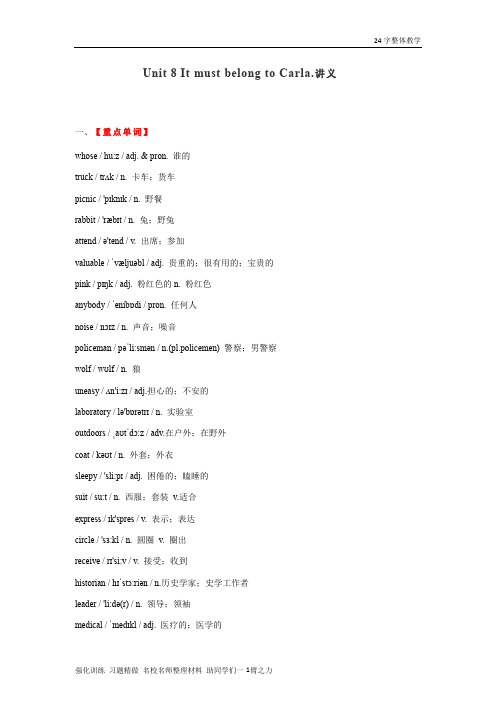
Unit 8 It must belong to Carla.讲义一、【重点单词】whose / hu:z / adj. & pron. 谁的truck / trʌk / n. 卡车;货车picnic / 'pɪknɪk / n. 野餐rabbit / 'ræbɪt / n. 兔;野兔attend / ə'tend / v. 出席;参加valuable / ˈvæljuəbl / adj. 贵重的;很有用的;宝贵的pink / pɪŋk / adj. 粉红色的n. 粉红色anybody / ˈenibɒdi / pron. 任何人noise / nɔɪz / n. 声音;噪音policeman / pəˈli:smən / n.(pl.policemen) 警察;男警察wolf / wʊlf / n. 狼uneasy / ʌn'i:zɪ / adj.担心的;不安的laboratory / lə'bɒrətrɪ / n. 实验室outdoors / ˌaʊtˈdɔ:z / adv.在户外;在野外coat / kəʊt / n. 外套;外衣sleepy / 'sli:pɪ / adj. 困倦的;瞌睡的suit / su:t / n. 西服;套装v.适合express / ɪk'spres / v. 表示;表达circle / 'sɜ:kl / n. 圆圈v. 圈出receive / rɪ'si:v / v. 接受;收到historian / hɪˈstɔ:riən / n.历史学家;史学工作者leader / 'li:də(r) / n. 领导;领袖medical / ˈmedɪkl / adj. 医疗的;医学的purpose / 'pɜ:pəs / n.目的;目标prevent / prɪ'vent / v. 阻止;阻挠energy / 'enədʒɪ / n. 精力;力量position / pəˈzɪʃn / n. 位置;地方burial / 'berɪəl / n. 埋葬;安葬honor / 'ɒnə(r) / (= honour) v. 尊重;表示敬意n. 荣幸;荣誉victory / 'vɪktərɪ / n. 胜利;成功enemy / ˈenəmi / n. 敌人;仇人period / ˈpɪəriəd / n. 一段时间;时期picnic / ˈpiknik / n.野餐mystery / ˈmistəri / n.秘密,迷团, 神秘;adj.神秘的;二、【重点短语】1. belong to… 属于…...2. toy truck 玩具卡车3. her favorite writer 她最喜爱的作家4. the only little lid唯一的小孩5. listen to pop music听流行音乐6. hair band 发带7. attend a concert 参加音乐会8. in the music hall 在音乐大厅9. something valuable 贵重的东西10.go to a picnic=go for a picnic去野餐11. at the picnic在野餐时12. the rest of my friends 我其余的朋友13. pick it up 捡起,拾起14. each other=one another 互相,彼此15. nothing much没什么(事)16. something unusual不寻常的东西17. something strange奇怪的事18. anything else其它的东西19. be interviewed by… 被…采访20. strange noises 奇怪的声音21. outside our window在我们的窗外22. next-door neighbor隔壁邻居23. at first 首先,起初24. run away 逃走25. feel uneasy 感到不安26. have no idea=don’t know 不知道27. go away 走开,离开28. noise-maker 噪音的制造者29. have fun doing sth.做某事开心30. create fear制造恐惧31.in the neighbourhood在社区;在附近32.a kind of一种33.see sb doing sth看见某人正在做某事34.not only...but also...不但...而且...35.a group of一组36.more than超过37.look like看起来像38.too much太多39.listen to classical music 听古典音乐40.go to the concert 去听音乐会41.have any/some idea 知道42. run for exercise 跑步锻炼三、【重点句型】1. If you have any idea where it might be,please call me.如果你知道它可能在哪,请打电话给我。
沪教版五年级上册英语Unit 8 An outing讲义(学生版)
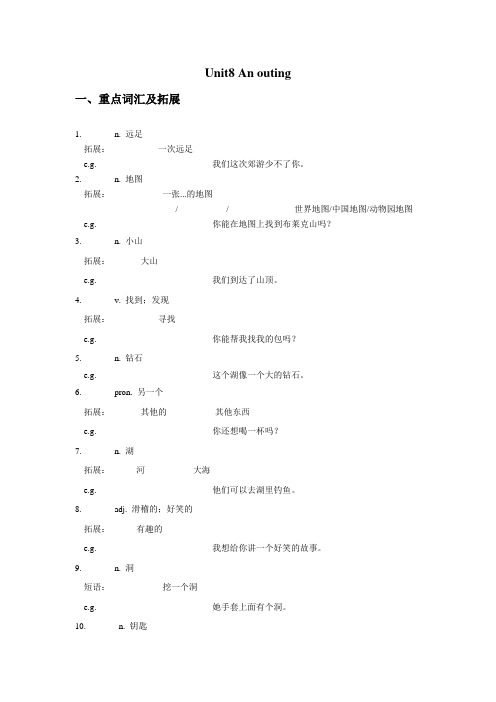
Unit8 An outing一、重点词汇及拓展1. _____ n. 远足拓展:__________ 一次远足e.g. _________________________ 我们这次郊游少不了你。
2. _____ n. 地图拓展:__________ 一张...的地图_______________/___________/_____________ 世界地图/中国地图/动物园地图e.g. _________________________ 你能在地图上找到布莱克山吗?3. _____ n. 小山拓展:_____ 大山e.g. _________________________ 我们到达了山顶。
4. _____ v. 找到;发现拓展:__________ 寻找e.g. _________________________ 你能帮我找我的包吗?5. _____ n. 钻石e.g. _________________________ 这个湖像一个大的钻石。
6. _____ pron. 另一个拓展:_____ 其他的_____ 其他东西e.g. _________________________ 你还想喝一杯吗?7. _____ n. 湖拓展:_____ 河_____ 大海e.g. _________________________ 他们可以去湖里钓鱼。
8. _____ adj. 滑稽的;好笑的拓展:_____ 有趣的e.g. _________________________ 我想给你讲一个好笑的故事。
9. _____ n. 洞短语:__________ 挖一个洞e.g. _________________________ 她手套上面有个洞。
10. _____ n. 钥匙短语:__________ 一串钥匙__________ 门的钥匙e.g. _________________________ 他用钥匙开了门然后走了进去。
沪教版四年级上册英语Unit8 At the shop讲义

Unit 8 At the shop一、基本知识点(一)词汇:shop [ʃɒp] 商店tomato [tə'mɑːtəʊ] 番茄;西红柿(复数tomatoes)soup [suːp]汤potato [pə'teɪtəʊ] 土豆(复数potatoes)carrot ['kærət] 胡萝卜thirty ['θɜːtɪ] 三十fish [fɪʃ] 鱼meat [miːt]肉rice [raɪs] 大米glasses ['glɑːsɪz]眼镜want [wɒnt] 想要together [tə'geðə] 一起magic ['mædʒɪk] 神奇的;有魔力的(二)短语:make soup 做汤would like…想要… (想要做… would like to do… = want to do…)a pair of…一副/双… (如:一副眼镜a pair of glasses)come to 来到want to do…想要做…play together 一起玩look at…看…a glasses shop 一个眼镜店have an idea 有一个主意in some Asian countries 在亚洲的一些国家(三)句型:1. What would you like? 你想要什么呢?I’d like some tomatoes. 我想要一些西红柿。
2. How much…? …多少钱呢?回答:用“数字+钱”直接回答。
(如:How much is your bag? -Thirty yuan.)3. Here you are. 给你。
4. Can I help you? 我能帮你吗?(四)重难点、易错点:1. some 的用法:用于肯定句中,表示一些;当疑问句表示请求,希望得到肯定回答时,也可用some。
[讲解] 1. I have some good friends. 我有一些好朋友。
Unit8讲义 人教版英语九年级全册
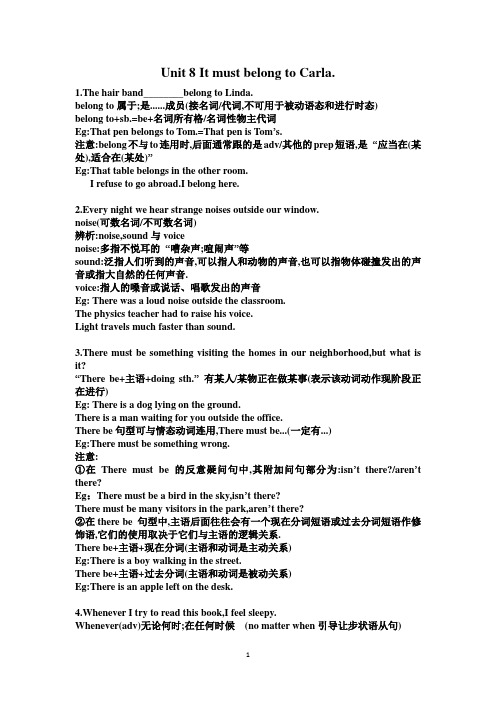
Unit 8 It must belong to Carla.1.The hair band________belong to Linda.belong to属于;是......成员(接名词/代词,不可用于被动语态和进行时态)belong to+sb.=be+名词所有格/名词性物主代词Eg:That pen belongs to Tom.=That pen is Tom’s.注意:belong不与to连用时,后面通常跟的是adv/其他的prep短语,是“应当在(某处),适合在(某处)”Eg:That table belongs in the other room.I refuse to go abroad.I belong here.2.Every night we hear strange noises outside our window.noise(可数名词/不可数名词)辨析:noise,sound与voicenoise:多指不悦耳的“嘈杂声;喧闹声”等sound:泛指人们听到的声音,可以指人和动物的声音,也可以指物体碰撞发出的声音或指大自然的任何声音.voice:指人的嗓音或说话、唱歌发出的声音Eg: There was a loud noise outside the classroom.The physics teacher had to raise his voice.Light travels much faster than sound.3.There must be something visiting the homes in our neighborhood,but what is it?“There be+主语+doing sth.”有某人/某物正在做某事(表示该动词动作现阶段正在进行)Eg: There is a dog lying on the ground.There is a man waiting for you outside the office.There be句型可与情态动词连用,There must be...(一定有...)Eg:There must be something wrong.注意:①在There must be的反意疑问句中,其附加问句部分为:isn’t there?/aren’t there?Eg:There must be a bird in the sky,isn’t there?There must be many visitors in the park,aren’t there?②在there be 句型中,主语后面往往会有一个现在分词短语或过去分词短语作修饰语,它们的使用取决于它们与主语的逻辑关系.There be+主语+现在分词(主语和动词是主动关系)Eg:There is a boy walking in the street.There be+主语+过去分词(主语和动词是被动关系)Eg:There is an apple left on the desk.4.Whenever I try to read this book,I feel sleepy.Whenever(adv)无论何时;在任何时候(no matter when引导让步状语从句)Eg:You can ask for help whenever you need it.辨析:asleep,sleep,sleeping,sleepless与sleepyasleep(adj)睡着的(只作表语) fall asleep入睡be asleep睡着sleep(n)睡觉;睡眠时间go/get to sleep入睡(v)睡觉sleeping(动名词)睡觉sleeping bag睡袋sleepless(adj)失眠的;不睡觉的 a sleepless night一个不眠之夜sleepy(adj)困倦的;昏昏欲睡的(可作表语/定语) feel sleepy想睡觉5.No,he’s wearing a suit.辨析: suit,clothes,clothing,cloth与dresssuit(cn)指由相同布料做成的套装;套装/一套衣服clothes(复数名词)统指各类衣服:上衣、裤子、内衣等(无单数形式,不与数词连用,但可以说these/many clothes)clothing(不可数名词)指总体服装,也指具体用途的服装eg:waterproof clothing(防水服)cloth:(un)物质名词,指做衣服的布料eg:cotton cloth棉布(cn) 指用作具体用途的布eg:a table clothdress:(un)指特定类型的衣服eg:evening dress 晚礼服casual dress便装(cn)连衣裙a piece of clothes一件衣服 a suit of clothes一套衣服suit(vt)适合(后接人,指符合某人的地位、身份、口味、性格、条件等)辨析:suit,fit与matchSuit:侧重符合某人的口味,或服装颜色、款式等的适合Eg:That haircut suits you.Blue suits you.It’s a small house but it suits our needs.Fit:往往强调尺寸、大小或形状上的吻合;还可表示两个相关事物在品质上相称或发展上相对应.Eg:This coat fits me very well. 这件外套我穿起来合身The key doesn’t fit well.这钥匙(与锁孔的形状)不吻合We have to fit ourselves to the requirement of our jobs.The tune exactly fits the words. 这首曲子与歌词很配Match:多指两个物体大小、色调、形状、性质等方面很相配,显得协调.Eg:Do these shoes match my dress?6.expressing the differenceexpress(v)表示;表达expression(cn)表情;表达方式①接反身代词表达自己的意思、思想、情感等Eg:The boy can’t express himself in English.②接疑问句引导的从句,但不接that从句Eg:I can’t express how happy I am now.③express(sth.)to sb. 向某人表达(某物)Eg:He expressed his thanks to me.7.Every year it receives more than 750,000 visitors.receive(vt)接受;收到(receive sth. from sb.收到来自某人的某物)辨析:receive与acceptreceive:(客观上)收到(不强调主观意愿上是否接受或同意)accept:(主观上)收到(强调主观意愿,如接受邀请或建议等)Eg:I received a gift from my friend,but I didn’t accept it in the end.receive(vt)接待;欢迎;招待(通常接sb.)Eg:She isn’t well enough to receive visitors.8.People like to go to this place especially in June as they want to see the sun rising on the longest day of the year.(人们尤其喜欢六月去那里,因为他们想在一年中白昼最长的一天看日出)as(conj)因为;由于(引导原因状语从句)辨析:because,since与asbecause:用来回答why的提问since:语气较because弱较as强表示显然的或对方已知的原因,即对已知事实提供理由(引导的原因状语从句一般位于主句的前面)as:语气较since弱从句说明原因,主句说明结果.表示十分明显或对方已知的原因,常用于口语Eg:We had to stay at home because it rained.Since you are busy,I won’t bother you.As I am leaving tomorrow,I’ve bought you a present.9.They think the stones can prevent illness and keep people healthy.prevent(vt)阻止;阻挠~sb.from doing sth.阻止某人做某事stop...from doing sth. keep...from doing sth.阻止做某事keep sb./sth.+adj 使某人/某物保持某种状态(keep+宾语+补足语结构)Eg:The coat will keep you warm.I’m sorry to keep you waiting.He kept his coat on.情态动词表示推测1.对不同时段发生的事情的推测表示方法对...的推测表示方法现在的事情情态动词+动原正在发生的事情情态动词+be+doing过去的事情情态动词+have+过去分词2.在不同句型中的推测表示放法①在肯定句中表示推测的情态动词的程度弱_________________强might→may→could→can→must(表示可能性的大小程度)②在否定句中can’t/couldn’t:表示有把握的否定推测(不可能) couldn’t的语气较can’t委婉may not/mightn’t:表示不太有把握的否定推测(可能不)③在疑问句中在疑问句中表示推测的情态动词,一般只用can/could(可能;会)Eg: Can it be true?注意:把含有must be的句子变为否定句时,需把must be 改成can’t beEg:We must be wrong. We can’t be wrong.我们不可能搞错了.表示推测时,反义疑问句的两种情况①陈述部分是对现在的状态(现在的事实)进行推测时,反义疑问句部分用现在时态Eg: They could be working at the hospital,aren’t they?②陈述部分是对过去发生的事情进行推测,若有表示过去的时间状语,反义疑问句用一般过去时;若无表示过去的时间状语,反义疑问句部分用现在完成时Eg: You might have been to Summer Palace,haven’t you?It must have rained last night,didn’t it?。
Unit8重难知识点(复习讲义)五年级英语上册单元速记巧练(译林版三起)

Unit 8 At Christmas(含答案)重难点讲解(含答案)一、重难点讲解1.We always have a lot of fun at Christmas. 我们在圣诞节总是玩得很开心。
解析:at Christmas意为“在圣诞节(期间)”,指的是在圣诞节前后的一段时间。
【拓展】on Christmas Day也可以译为“在圣诞节”,但它指的是在圣诞节当天。
【例句】(1) I will e back at Christmas. 我将在圣诞节(期间)回来。
(2) Children always get many presents on Christmas Day.孩子们总是在圣诞节(当天)收到许多礼物。
【练习】(1)单项选择。
( ) We have a great time Christmas Day.A. inB. onC. at(2)选出句子中错误的一项,并在横线上改正。
( ) We often buy a Christmas tree on Christmas.A B C【答案】(1) B (2)C at2.First, we buy presents for our family and friends. 首先,我们为我们的家人和朋友们买礼物。
解析:本句中的first 为表示顺序的副词,意为“首先”。
在本单元中,表示顺序的副词还有:next(接着,然后), then(然后), finally(最后)。
➢buy sth for sb意为“为某人买某物”,相当于buy sb sth。
当sth为代词时,只能使用buy sth for sb 这一结构。
【例句】(1) First, make two snowballs. 首先,做两个雪球。
Next, put the small one on the big one. 接着,把小雪球放在大雪球上。
Then, put two black balls on the face as the eyes. 然后,把两个黑色的球放在脸上作为眼睛。
沪教版四年级下册英语Unit8 Days of the week讲义

Unit 8 Days of the week 一、基本知识点(一)词汇:Monday [ˈmʌndeɪ; ˈmʌndi]with [wɪð]Tuesday ['tjuːzdeɪ; -dɪ]Wednesday [ˈwenzdɪ]Thursday ['θɜːzdeɪ; -dɪ]Friday [ˈfraɪdeɪ]game [geɪm]Saturday [ˈsætədɪ; -deɪ]Sunday [ˈsʌndeɪ; ˈsʌndi]clock [klɒk](二)短语:play chess 下国际象棋at the weekend 在周末(be) late for 迟到(三)句型:1. Peter goes to the school library on Monday afternoon.彼特在周一下午去学校图书馆。
2. Peter likes reading.彼特喜欢阅读。
3. I’m late.我迟到了。
(四)重难点、易错点:1. 介词on 的用法。
2. 词类:表星期。
3. like的用法4. 复习一般现在时5. 写作:学会如何描述自己一周所做的事情。
二、典型例题Peter ________ to the school library.A. goB. goesC. is go【解析】答案:B 根据Peter为第三人称单数,所以应该用单三形式.可知答案为B。
三、变式习题基础题(一)词汇星期一星期二星期三星期四星期五星期六星期天星期游戏在周末下象棋迟到(二)补全单词并翻译汉语w th ( )g m ( )c l k ( )w k nd ( )l t ( )提高题(一)单项选择( ) 1. I go to the park ________ Tuesday afternoon.A. inB. onC. at ( ) 2. Tom often ________ after school.A. plays the chessB. play chessC. plays chess ( ) 3. Alice likes ________.A. readB. readingC. reads ( ) 4. ________the weekend, Mike goes to the park ________ his friends.A. At; withB. Of; withC. In; with(二)按要求改写句子1. Joe and Jack like swimming. (变为疑问句)_______________________________________________________________ 2. Does Mary go to the zoo every day? (写出否定回答)_______________________________________________________________ 3. Do you play chess with your father every day? (根据实际情况回答)_______________________________________________________________ 4. It’s six o’clock(对划线部分提问)_______________________________________________________________ 5. It’s Wednesday. (对划线部分提问)_______________________________________________________________强化题(一)连词成句1. plays, basketball, on, he, friend, Thursday, his, with, afternoon ( . )_______________________________________________________________2. shopping, often, I, go, my, with, mom ( . )_______________________________________________________________3. reading, Alice, the, likes, evening, in ( . )_______________________________________________________________4. what, now, it, now, is ( ? )_______________________________________________________________5. Peter, late, is, school, not, for ( . )_______________________________________________________________(二)阅读短文,判断句子正误,填入T(正确)或F(错误)Mr. Green lives in a small town with his wife. Their house is very big and nice. From Mondays to Fridays he works in a company(公司) near his house. He is free(空闲) on Saturdays and Sundays. He has a nice garden beside his house. He likes growing flowers and he often works in the garden on Saturdays and Sundays. The flowers are very beautiful and Mrs. Green likes them very much. She often helps Mr. Green.()1. Mr. Green lives in a big town with his wife.()2. He works five days a week in a company.()3. He isn't busy on Saturdays and Sundays.()4. He likes playing in his garden on Saturdays and Sundays.()5. Mr. Green doesn't like the flowers.(三)写作请描述一下你一周做的事情,不少于五句话。
三年级英语下册Unit8We'retwins课内提优讲义(含答案)译林版三起

第一局部:重难点全解【解析】句型“We're 十表示关系或身份的名词。
〞,一般用来介绍“我们〞之间的关系或身份,其中,we're 是we are 的缩写形式。
另外,twins 意为“双胞胎〞,即指的是一对双胞胎两个人,假如单指双胞胎中的一个人,那么应用twin 。
【例句】(1)We're good friends.我们是好伴侣。
(2)Su Hai and Su Yang are twins.苏海和苏洋是双胞胎。
【练习】单项选择。
( )The girl under the tree is my . both tall.A.twin sisters;They'reB.twins sister;She'sC.twin sister;We're【答案】C【解析】句型“Who is ...?〞是由who 引导的特别疑问句,一般用来询问某人是谁,其中,who is 可以缩写为who's 。
答复时要依据主语性别的不同,选用“He's...〞或“She's...〞进行答复。
【拓展】当询问多个人物是谁时,可以使用句型“Who are...?〞,其答复为“They're...〞。
【例句】(1)Who is that boy?那个男孩是谁?He is my cousin.他是我的表弟。
(2)Who is that woman?那位女士是谁?She is Mrs Black.她是布莱克夫人。
(3)Who are they?他们是谁?They are Wang Bing and Liu Tao.他们是王兵和刘涛。
【练习】单项选择。
( ) that man, Mike? He's my .A.Who's;motherB.Who's;fatherC.Who;uncle【答案】B【解析】句型“Is this?〞意为“这是…吗?〞,一般用来猜想距离说话者较近的某人的身份。
Unit8语法(复习讲义)六年级英语上册单元速记巧练(译林版三起)

Unit 8 Chinese New Year语法梳理:一般将来时精讲精练(含答案)❖一般将来时( be going to) 的陈述句1.定义:一般将来时表示将要发生的动作或状态,打算、计划或准备要做的事情,也表示将来可能发生的事情,常与表示将来的时间状语连用。
2.常见的表示将来的时间状语有:tomorrow, next week, next year, soon, in a few days等。
3.“be going to+动词原形”是一般将来时的常见结构,其中be动词要随主语的变化而变化。
表示否定时则在be动词后加not。
例如:I'm(not) going to play football with Mike tomorrow.我明天将要(将不会)和迈克踢足球。
Wang Bing is(not) going to watch a film on Sunday.王兵周日将要(将不会)看电影。
They are(not) going to stay at home this weekend. 这周末他们打算(不打算)待在家里。
✓拓展:有的动词(e,go,leave,arrive等表示位置移动的单词)经常用现在进行时表示将来时,说明将要发生的事。
例如:Chinese New Year is ing.中国农历新年就要到了。
I'm going to Suzhou.我将要去苏州。
When is your father leaving?你父亲打算什么时候动身离开?【考题精练】一、用所给单词的适当形式填空。
1. My brother (go) to Shanghai next week.2. Mary (visit) her grandparents tomorrow.3. David and Tommy (give) a puppet show next Monday.4. I (make) a plan for my study in two days.5. Miss Li (e). Stop (talk)!6. She usually (watch) TV at weekends, but next Saturday she (play) football.二、按要求完成句子。
Unit8 when is your birthday 2020年秋七年级上册英语辅导讲义(人教版)
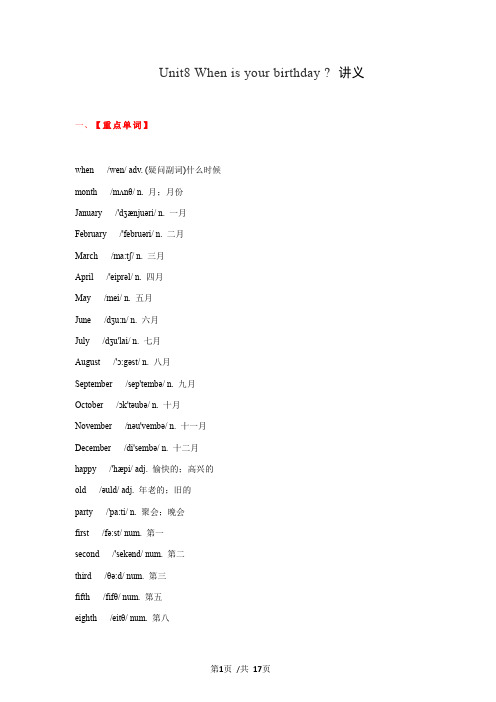
Unit8 When is your birthday ? 讲义一、【重点单词】when /wen/ adv. (疑问副词)什么时候month /mʌnθ/ n. 月;月份January /'dʒænjuəri/ n. 一月February /'februəri/ n. 二月March /ma:tʃ/ n. 三月April /'eiprəl/ n. 四月May /mei/ n. 五月June /dʒu:n/ n. 六月July /dʒu'lai/ n. 七月August /'ɔ:gəst/ n. 八月September /sep'tembə/ n. 九月October /ɔk'təubə/ n. 十月November /nəu'vembə/ n. 十一月December /di'sembə/ n. 十二月happy /'hæpi/ adj. 愉快的;高兴的old /əuld/ adj. 年老的;旧的party /'pa:ti/ n. 聚会;晚会first /fə:st/ num. 第一second /'sekənd/ num. 第二third /θə:d/ num. 第三fifth /fifθ/ num. 第五eighth /eitθ/ num. 第八ninth /nainθ/ num. 第九twelfth /twelfθ/ num. 第十二twentieth /'twentiəθ/ num. 第二十test /test/ n. 测验;检查trip /trip/ n. 旅游;旅行art /a:t/ n. 艺术;美术festival /'festivl/ n. (音乐、戏剧等的)节;节日dear /diə/ adj. 亲爱的student /'stju:dnt/ n. 学生thing /θiŋ/ n. 东西;事情term /tə:m/ n. 学期busy /'bizi/ adj. 忙碌的;无暇的time /taim/ n. 时间there /ðeə/ adv. (在)那里二、【重点短语】1. my father’s birthday 我爸爸的生日2. Happy birthday (to you)! (祝你)生日快乐!3. in August 在八月4. have a birthday party 举办一个生日派对5. have a book sale 举行一次书籍拍卖6. have an art festival 举办一次艺术节7. have an English party 举办一个英语派对8. have a basketball game 举办一场篮球赛9. School Day 学校开放日10. Teachers’ Day 教师节11. Mother’s Day 母亲节12. Women’s Day 妇女节13. Sports Day 体育节14. two ball games 两场球赛15. this term 这学期16. in the afternoon 在下午17. on the 12th 在12日那天18. next month 下个月19. in the school library 在学校图书馆20. have a good time 玩得开心21.How old...? ...多大年纪?...几岁了?22.See you! 再见!23.school trip 学校旅游24.English test 英语测试25. come to my birthday party 来参加我的生日派对三、【重点句型】1. —When is your/his/her birthday? 你/他/她的生日是何时?—My/His/Her birthday is on May11th. 我/他/她的生日是5月11日。
沪教版五年级上册英语Unit8 An Outing讲义

Unit 8 An Outing 一、基本知识点(一)词汇:outing[ˈaʊtɪŋ]远足map [mæp] 地图hill [hɪl] 小山find [faɪnd] 发现,找到diamond [ˈdaɪəmənd ] 钻石another [əˈnʌðə(r)] 另一个lake [leɪk] 湖funny [ˈfʌni] 滑稽的,好笑的hole [həʊl] 洞key [ki:] 钥匙think [θɪŋk]想(二)短语:at the top of 在…顶部get through 穿过on the hill 在山上here’s a letter 这里有一封信find a letter 找到一封信read the map 读地图How funny ! 多有趣啊!in the garden 在园子里wear a coat 穿了一件衣服run away 跑走了run after 在后面追着jump into 跳进去a big hole 一个大洞a small door 一个小门a small key 一个小钥匙open the door 打开门(三)句型:1. What are you doing?你在干什么?What’s he/she doing.他/她在干什么2.I’m reading the map.我正在读地图。
He/She is painting.他/她正在读地图3. We’re at Green hill.我们在绿山上。
4. The big stone is on the hill.那块大石头在山上。
5. Let’s read it.让我们读一下。
6. You can find a diamond at the top of the hill. 你在山顶能找到一个钻石。
7. Where is the diamond?钻石在哪里?8.The lake is like a big diamond.这湖像个大钻石。
沪教版六年级上册英语Unit 8 Visiting museums讲义(教师版)
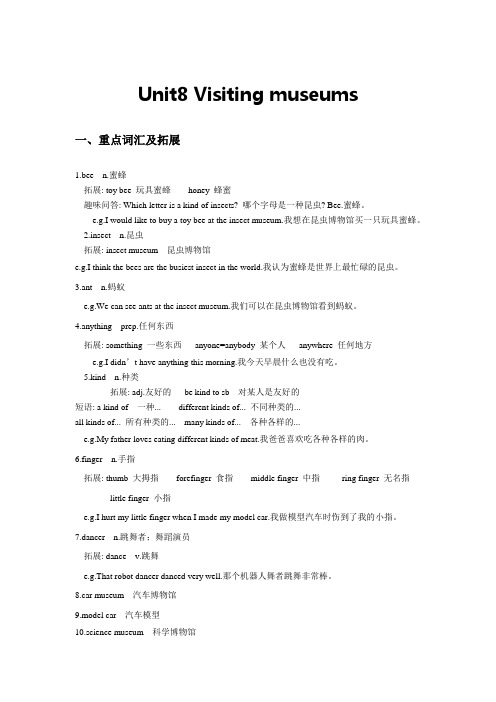
Unit8 Visiting museums一、重点词汇及拓展1.bee n.蜜蜂拓展: toy bee 玩具蜜蜂honey 蜂蜜趣味问答: Which letter is a kind of insects? 哪个字母是一种昆虫? Bee.蜜蜂。
e.g.I would like to buy a toy bee at the insect museum.我想在昆虫博物馆买一只玩具蜜蜂。
2.insect n.昆虫拓展: insect museum 昆虫博物馆e.g.I think the bees are the busiest insect in the world.我认为蜜蜂是世界上最忙碌的昆虫。
3.ant n.蚂蚁e.g.We can see ants at the insect museum.我们可以在昆虫博物馆看到蚂蚁。
4.anything prep.任何东西拓展: something 一些东西anyone=anybody 某个人anywhere 任何地方e.g.I didn’t have anything this morning.我今天早晨什么也没有吃。
5.kind n.种类拓展: adj.友好的be kind to sb 对某人是友好的短语: a kind of 一种... different kinds of... 不同种类的...all kinds of... 所有种类的... many kinds of... 各种各样的...e.g.My father loves eating different kinds of meat.我爸爸喜欢吃各种各样的肉。
6.finger n.手指拓展: thumb 大拇指forefinger 食指middle finger 中指ring finger 无名指little finger 小指e.g.I hurt my little finger when I made my model car.我做模型汽车时伤到了我的小指。
人教版九年级英语Unit8单词讲义

人教版九年级上册Unit 8单词讲义1.whose adj. & pron. 谁的who主格whom宾格Whose book is this? It must be Mary’s.Whose dictionary is this?=Whose is this dictionary?2.truck n.卡车a toy truck3.picnic n.野餐go to a picnicgo for a picnic go on a picnichave a picnic have picnicsShall we go for a picnic this weekend?4.rabbit n.兔5.attend v.出席;参加Many movie stars are expected to attend.He mistook the date and didn’t attend that wedding. attend school上学attend lessons上课attend the meeting出席会议区别attend, join, take part inattend 通常指出席会议或参加典礼等,也可指上学、听课、听演讲或讲座等。
join 表示加入某个组织、团体或人群成为其中的一员。
join the army/navy join us join the swimming club take part in表示参加某项具体的群众性的活动,并在活动中发挥作用。
如take part in the sports meetingHe didn’t ___________the meeting yesterday.He _________the army at the age of 19.He always ________________after-school activities.6.valuable adj.贵重的;宝贵的value n.价值v.重视;珍视Thank you for your valuable suggestions.Do you have anything valuable in your schoolbag?be valuable to sb.=be of value to sb. 对某人宝贵Your advice is valuable to me.Your advice is of value to me.We value the time we spend with our family and friends in our everyday lives.7.pink adj.粉色的n.粉红色8.anybody pron.任何人常用于否定句、一般疑问句与条件句中,用于肯定句中时,意为“任何一个人”Is there anybody who can help me?有人能帮我吗?She wasn’t anybody before she got that job.她在获得那个工作之前不过是个无名之辈。
初二下册英语第八单元讲义unit8语法篇

Unit 8 语法篇知识梳理)现在完成时态中already, yet, just, never, ever用法区别1、already意思是"已经”通常用于陈述句中(放在have和has的后面)She has already found her bike.2、yet用法①yet可用于否定句,此时译为"还”;I haven 'found my ruler yet.②也可以用于疑问句,译为“已经”(放在have和has的后面也可放在句末)Have you found your ruler yet ?你已经找到尺子了吗?3、just只用于陈述句意思是"刚才”(放在have和has的后面)I have just received a letter.4、never用于否定句译为"从不”(放在have和has的后面)I ve never been to Beijing.5、ever用于疑问句译为"曾经”(放在have和has的后面)Have you ever bee n to Beiji ng?6、have/has bee n to; have/has gone to; have/has bee n in(1) have gone to意为"到某地去”,说话时该人不在现场,一般不用第一人称、第二人称代词作句子的主语。
如:—Where is Jim ? --------- 吉姆在哪里?—He has gone to En gla nd. -------- 他去英国了。
(尚未回来)Mr Wang isn't here . He has gone to Qingdao .王先生不在这里。
他去青岛了。
⑵have been to意为"曾经去过某地”,现在已不在那里了,后可接次数,如once, twice , three times 等,表示"去过某地几次”,也可和just, never, ever等连用。
Unit8grammar知识点讲义牛津译林版英语七年级上册

【Grammar】重点单词1. lie vi.躺,平放→(现在分词) lying 【Grammar】重点短语1. write to 写信给2.be a member of .... 成为……的一员3.talk to sb. 跟某人谈话4. wait for 等候5.dancing lessons/classes 舞蹈课6.. look for 寻找7.play a new puter game 玩新的电脑游戏8. play with sb. 和某人玩耍9. lie on the bed 躺在床上【Grammar】重点句子&语法1. Look! Simon is playing football with his friends in the playground. 看!西蒙正在操场上和他的朋友们踢足球。
2. Millie is writing a letter to her friend about the fashion show. 米莉正在给她的朋友写一封关于时装表演的信。
3. I am eating. 我在吃东西。
4. You/ We/ They are eating. 你(们)/我们/他们在吃东西。
5. He/ She/ It is eating. 他/她/它在吃东西6. I am not eating. 我没在吃东西。
7. You/ We/ They are not eating. 你(们)/我们/他们没在吃东西。
8. He/ She/ It is not eating. 他/她/它没在吃东西。
9.—Am I eating? 我在吃东西吗? —Yes, I am. / No, I am not / 'm not. 是的,我在吃东西。
/不是,我没在吃东西。
10.—Are you / we / they eating? 你(们)/我们/他们在吃东西吗?—Yes, you / we / they are. / No, you /we / they are not / aren’t.是的,你(们)/我们/他们在吃:2.0东西。
人教版英语八上Unit8 讲义
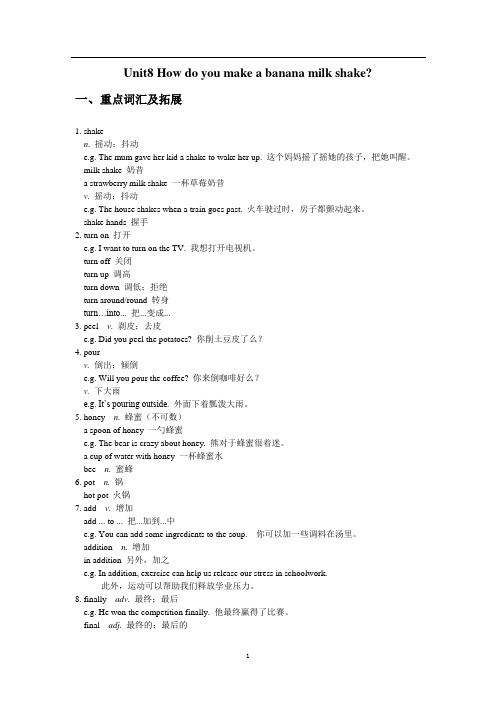
Unit8 How do you make a banana milk shake?一、重点词汇及拓展1. shaken. 摇动;抖动e.g. The mum gave her kid a shake to wake her up. 这个妈妈摇了摇她的孩子,把她叫醒。
milk shake 奶昔a strawberry milk shake 一杯草莓奶昔v. 摇动;抖动e.g. The house shakes when a train goes past. 火车驶过时,房子都颤动起来。
shake hands 握手2. turn on 打开e.g. I want to turn on the TV. 我想打开电视机。
turn off 关闭turn up 调高turn down 调低;拒绝turn around/round 转身turn…into... 把...变成...3. peel v.剥皮;去皮e.g. Did you peel the potatoes? 你削土豆皮了么?4. pourv. 倒出;倾倒e.g. Will you pour the coffee? 你来倒咖啡好么?v. 下大雨e.g. It’s pouring outside. 外面下着瓢泼大雨。
5. honey n.蜂蜜(不可数)a spoon of honey 一勺蜂蜜e.g. The bear is crazy about honey. 熊对于蜂蜜很着迷。
a cup of water with honey 一杯蜂蜜水bee n.蜜蜂6. pot n. 锅hot pot 火锅7. add v.增加add ... to ... 把...加到...中e.g. You can add some ingredients to the soup. 你可以加一些调料在汤里。
addition n.增加in addition 另外,加之e.g. In addition, exercise can help us release our stress in schoolwork.此外,运动可以帮助我们释放学业压力。
Unit8Ourdreams(讲义)译林版英语六年级下册
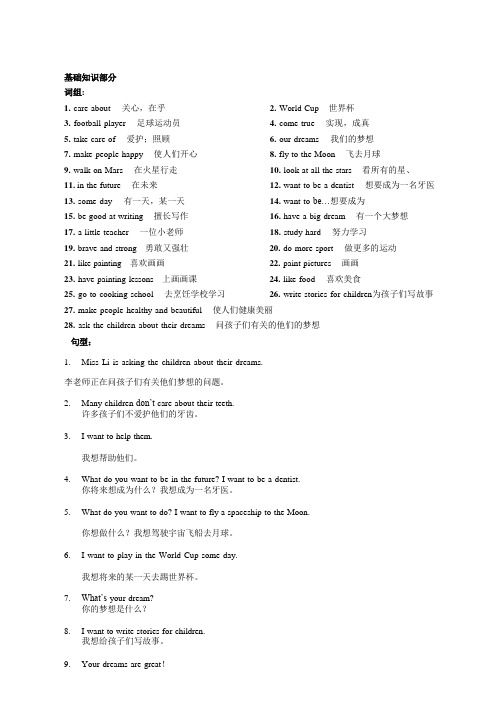
基础知识部分词组:1. care about关心,在乎2. World Cup 世界杯3. football player足球运动员4. come true实现,成真5. take care of爱护;照顾6. our dreams我们的梦想7. make people happy使人们开心8. fly to the Moon飞去月球9. walk on Mars在火星行走10. look at all the stars看所有的星、11. in the future在未来12. want to be a dentist想要成为一名牙医13. some day有一天,某一天14. want to be…想要成为15. be good at writing擅长写作16. have a big dream有一个大梦想17. a little teacher一位小老师18. study hard努力学习19. brave and strong 勇敢又强壮20. do more sport做更多的运动21. like painting 喜欢画画22. paint pictures画画23. have painting lessons 上画画课24. like food喜欢美食25. go to cooking school去烹饪学校学习26. write stories for children为孩子们写故事27. make people healthy and beautiful使人们健康美丽28. ask the children about their dreams问孩子们有关的他们的梦想句型:1.Miss Li is asking the children about their dreams.李老师正在问孩子们有关他们梦想的问题。
2.Many children don’t care about their teeth.许多孩子们不爱护他们的牙齿。
沪教版三年级下册英语Unit 8 Happy birthday讲义
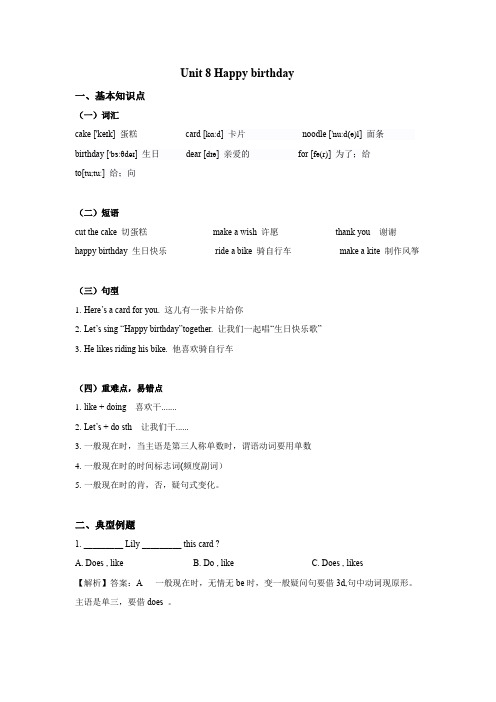
Unit 8 Happy birthday一、基本知识点(一)词汇cake ['keɪk] 蛋糕card [kɑːd] 卡片noodle ['nuːd(ə)l] 面条birthday ['bɜːθdeɪ] 生日dear [dɪə] 亲爱的for [fə(r)] 为了;给to[tu;tuː] 给;向(二)短语cut the cake 切蛋糕make a wish 许愿thank you 谢谢happy birthday 生日快乐ride a bike 骑自行车make a kite 制作风筝(三)句型1.Here’s a card for you. 这儿有一张卡片给你2.Let’s sing “Happy birthday”together. 让我们一起唱“生日快乐歌”3.He likes riding his bike. 他喜欢骑自行车(四)重难点,易错点1.like + doing 喜欢干.......2.Let’s + do sth 让我们干......3.一般现在时,当主语是第三人称单数时,谓语动词要用单数4.一般现在时的时间标志词(频度副词)5.一般现在时的肯,否,疑句式变化。
二、典型例题1. _________ Lily _________ this card ?A.Does , likeB. Do , likeC. Does , likes【解析】答案:A 一般现在时,无情无be时,变一般疑问句要借3d,句中动词现原形。
主语是单三,要借does 。
2.Let’s _________ the cake.A.cutB. makingC. makes【解析】答案:A Let’s 后要加动词原形3.My mother likes _________ a kite.A.flyB. flyingC. flies【解析】答案: B 固定搭配,like +doing三、变式习题:(一)选出与所给单词属于同类的一项。
2022年自考英语二教材课文讲义unit8
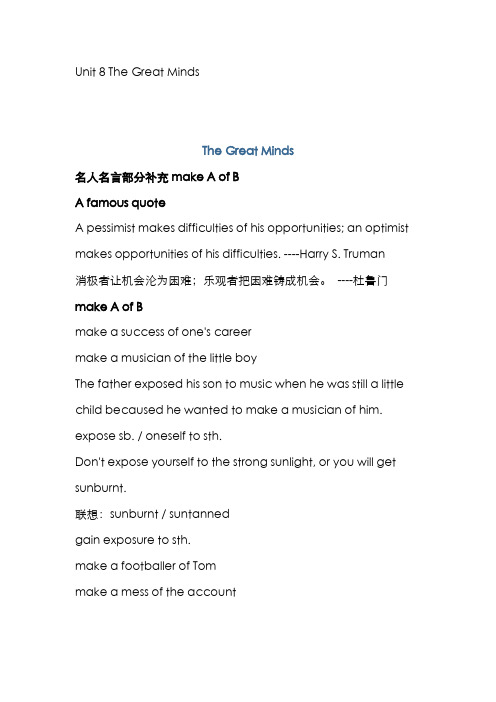
Unit 8 The Great MindsThe Great Minds名人名言部分补充make A of BA famous quoteA pessimist makes difficulties of his opportunities; an optimist makes opportunities of his difficulties. ----Harry S. Truman消极者让机会沦为困难;乐观者把困难铸成机会。
----杜鲁门make A of Bmake a success of one's careermake a musician of the little boyThe father exposed his son to music when he was still a little child becaused he wanted to make a musician of him. expose sb. / oneself to sth.Don't expose yourself to the strong sunlight, or you will get sunburnt.联想:sunburnt / suntannedgain exposure to sth.make a footballer of Tommake a mess of the accountI. New words and expressionsNew words1. wrap v. 用…缠绕(或围紧)2. scenario n. 设想;方案;预测3. explanation n. 解释;阐明explainexplanatory4. uneventful adj. 平淡无奇旳;平凡旳;缺乏刺激旳5. pregnancy n. 怀孕;妊娠;孕期6. imperfect adj. 有缺陷旳;不完全旳;不完美旳perfectperfection联想:impossible, impolite, imbalanced, immobile, immature (注意:unbiased, unmoving)7. abnormal adj. 不正常旳;反常旳;变态旳;畸形旳normal联想:typical-atypicalsymmetry-asymmetrysymmetrical-asymmetrical8. massive adj. 巨大旳;非常严重旳9. disability n.(某种)缺陷,障碍ableabilityunable10. limbless adj. 无四肢旳11. inspire v. 鼓励;鼓舞(使用办法参照Unit 5, Text A)inspiration (形近词参照Unit 4,Text A)inspiring12. adapt v. 适应(新状况)adapt oneself to sth.13. accomplish v. 完毕14. limb n. 肢;臂;腿15. campaign 运动(为社会、商业或政治目旳而进行旳一系列有计划旳活动)16. fulfill v. 实现;履行fulfill one's dream / word / requirementfulfilling使人满足旳,令人快乐旳fulfillment 履行;满足;成就17. motivational adj. 鼓舞旳18. circumstance n. 命运;客观环境19. wholeheartedly adv. 全心全意地20. effective adj. 产生预期成果旳;有效旳比较:efficientineffective, inefficient21. altitude n. 海拔;海拔高度altitude sickness辨别:attitude22. engagement n. 约定;约会;预约23. congregation n. (教堂旳)会众24. audience n. 观众;听众25. vision n. 想象力;眼力;远见卓识26. outreach n. 外展服务27. perspective n. 态度;观点;思索措施28. cease v. (使)停止,终止,结束29. obstacle n. 障碍;阻碍;绊脚石30. illustrate v. (用示例、图画等)阐明,解释31. profound adj. 巨大旳;深切旳;深远旳32. persistence n. 坚持;锲而不舍persist (in)persistent33. paralyze v. 使瘫痪;使麻痹34. oftentimes adv. 常常35. trick n. 戏法;把戏tricky36. blend n. (不一样事物旳)友好结合,融合37. perseverance n. 毅力;韧性;不屈不挠旳精神(偶见perseverence,但很少使用)persevereperseverant (偶见perseverent,但很少使用)38. define v. 阐明;明确;界定definitiondefinite 明确旳,确定旳39. incredible adj. 不能相信旳;难以置信旳unbelievable40. captivate v. 迷住;使着迷Phrases and Expressions1. a walk of life行业;职业;地位;阶层line of work2. major in主修3. stress the importance of 强调…旳重要性4. at one's disposal 任某人处理;供某人任意使用5. poke fun at 拿…开心;奚落;讥笑6. show off 炫耀;卖弄II. Text LearningLife Without Limits①Imagine being born without arms. No arms to wrap around someone, no hands to experience touch, or to hold another hand with. Or what about being born without legs? Having no ability to dance, walk, run, or even stand on two feet. Now put both of those scenarios(设想)together: no arms and no legs. What would you do? How would that effect your everyday life?②Born in 1982 in Melbourne, Australia, withoutany medical explanation or warning, Nicholas Vujicic came into the world with neither arms nor legs. (1)Having had an uneventful pregnancy and no family history to expect this condition, imagine the shock his parents felt when they saw their first born, brand new baby boy, only to find he was what the world would consider imperfect and abnormal. How would their son live a normal happy life? What could he ever do or become when living with what the world would see as such a massive disability(严重残疾)? (2)Little did they or anyone know that this beautiful limbless baby would one day be someone who would inspire and motivate people from all walks of life, touching lives all over the world.本部分重点及难点:1. Having had an uneventful(平凡旳)pregnancy and no family history to expect this condition, imagine the shock his parents felt when they saw their first born, brand new baby boy, only to find he was what the world wouldconsider imperfect and abnormal.(1) 悬垂分词。
Unit8单元固定短语具体用法讲义人教版八年级英语上册

2024人教版英语八年上册Unit8固定短语具体用法讲义一:这些短语的具体用法和例句:k shake:奶昔,一种用牛奶、冰淇淋和其他成分混合制成的饮料。
例如:I want a milk shake.(我想要一杯奶昔。
)2.turn on:接通(电流、煤气、水等);打开,例如:Turn on thelight.(打开灯。
)3.pour…into…:把……倒入……,例如:Pour the milk into theglass.(把牛奶倒入杯子里。
)4. a cup of yogurt:一杯酸奶,例如:I'd like a cup of yogurt.(我想要一杯酸奶。
)5. a good idea:好主意,例如:That's a good idea.(那是个好主意。
)6.on Saturday:在星期六,例如:I have a party on Saturday.(我在星期六有个聚会。
)7.cut up:切碎,例如:Cut up the vegetables.(把蔬菜切碎。
)8.put…into…:把……放入……,例如:Put the books into the bag.(把书放进包里。
)9.one more thing:还有一件事,例如:One more thing, I needto buy some sugar.(还有一件事,我需要买些糖。
)10.a piece of:一片/张/段/首……,例如:A piece of cake.(一块蛋糕。
)11.a t this time:在这时,例如:At this time, I was very nervous.(在这时,我非常紧张。
)12.a few:一些;几个,例如:I have a few friends.(我有几个朋友。
)13.f ill… with…:用……把……装满,例如:Fill the bottle with water.(用把瓶子装满水。
- 1、下载文档前请自行甄别文档内容的完整性,平台不提供额外的编辑、内容补充、找答案等附加服务。
- 2、"仅部分预览"的文档,不可在线预览部分如存在完整性等问题,可反馈申请退款(可完整预览的文档不适用该条件!)。
- 3、如文档侵犯您的权益,请联系客服反馈,我们会尽快为您处理(人工客服工作时间:9:00-18:30)。
Unit 8 I’ll help clean up the city parksBy Huang Ting 2009-10-15 一、学习目标(Language Goal)1.学会使用“I will…”,“I would like…”的句型,向别人提供帮助。
2.学会用“I will…”做规划。
3.掌握向别人提供帮助的一些动词短语。
4.学会谈论如何制定计划和志愿者活动。
二、知识解读本单元以“volunteering”为话题,谈论如何主动为他人提供帮助,学习动词短语的意义和用法,学会向老师和同学介绍一个对象或一个事件。
本单元的学习有助于训练学生运用英语动词及短语的能力。
(一)重点短语1.clean up 打扫干净2.cheer up 使振奋3.put off 推迟4.set up 建立5.come up with 6.think up 想出7.take after 与……相像8.fix up 修理9.give away 赠送,分发10.put up 张贴11.run out of用完12.call up 打电话给13.hand out 分发14.work out 结果为15.help out 帮助(某人)摆脱困境16.coach a team 执教一个队(二)交际用语1. —I’d like to work outside. —You could help clean up the city parks.2. I’ll hand out advertisements after school.3. You could give out food at a food bank.(三)单元学习策略及写作利用“做笔记”和“个性化”的学习方法,学生通过和partner探讨“volunteering work”这个话题,掌握本单元中所涉及的短语动词的基本用法,在交际中运用。
在单元学习结束时,结合所学内容写出志愿者活动内容和制定计划的短文。
三、情感目标通过学习表达如何主动为他人提供帮助,培养学生主动为他人服务的意识,学会关注社会、关心他人,同时自身变得更加成熟,有更广阔与人打交道的机会,从而在做事中不断成长,获得自信。
[重点与难点]重点:掌握所学单词、短语、句型及用目标语言训练学生听、说、读、写能力难点:短语的熟练运用四、教学计划Period One & Two: Section A 1a ~ 2c, Grammar FocusPeriod Three: Section A 3a, Section B 1a ~ 1bPeriod Four: Section B. Self check 1 ~ 2 writingPeriod Five & Six: Reading. Section 4 writingPeriod One & TwoTeaching content: Section A 1a ~ 2c. Grammar FocusStep 1. Lead-inSs, do you remember these sentences.Longer vacations would give us time to do things like v .Last summer I had an opportunity to v at the local hospital. the words we use here are volunteering and volunteer.So, who can tell me the meaning of “volunteer ”?After Ss explain it, make a conclusion.V olunteer means a parson who offers to help others, and it also means a person who offers to do sth unpleasant or even dangerous without being paid. Here, volunteer is used as a verb. Let ’s volunteer today. Let ’s have a volunteering attitude!Step 2. 1a & 2c Would you like to help others?How / In what ways could we help people? Ask Ss to be creative and help them todraw the map. Motivationplace specific waysatwarm heart beautiful mind Come up with a plan / some ways, not put off making a planwrite down all the ideas, work with people, put up signs/noticehard out advertisements, ask …to comeoutside clean up the city parks, fix up …(bikes, etc ) give away …(books, clothes, etc.) homeclean up the old people ’s housesatat theTell Ss an experience of volunteering When I was in Junior and Senior High School, I volunteered every week.I. set up a student volunteer project to help old people. Me and my friends visited the Old People ’s Home once a week. We helped them do clean-up, cook dinner and wash clothes. They enjoyed our company so much. So, we made friends with them and we loved to hear their stories. When it was getting dark, and it was time to say good bye. They always held our hands and said with a big smile “Thank you daughter.” We felt happy and grateful too. For not only do I feel good about helping people, but I get to know more about life and it helps me to grow righteously. I feel I ’m needed. Young people should give care and love to old people. It feels/does feel great to be a volunteer.Read together:Being a volunteer is great! / wonderful / fantastic / fabulousLet ’s become volunteers today!Let ’s volunteer today!Step 3 1b, 2a, 2b Listening practiceAsk the Ss who didn ’t say the ways in step 2 , make sure each student has a chance of speaking.schoolhelp kids with their schoolwork volunteer in an after school program / care center help young children to read and write set up / join a student volunteer project help coach a (football )team start a (Chinese )History Club cheer up sad classmatesvisit sick people cheer up the kids who have serious disease work at a local hospital work in an animal hospital (food/tree) bankhelp homeless people give away / out food plant treesStep 4 Discussion—What would you like to do if you want to be volunteers?—I’d like to…Step 5 RevisionSentences: You could…I’d like to…Phrases1. homeless people: people without a homehome n.—homeless adj. forget v.—forgetful care—careful—careless thank—thankful—thankless help—helpful—helpless hope—hopeful—hopeless 2. clean upThey have to clean up the room after the dance.use up 花完sell up 卖完eat up 吃光Ask Ss to find them on P60 ~ 61 and read aloud.Period 3Teaching content: Section A 3a and Section B 1a~1bStep I RevisionDo you remember Old Henry? He lives alone and recently his dog ran away from him. What would you like to do to help him or old people like him and could you come up with a plan?Step II 3aThe nursery is home to children. 托儿所是孩子的家。
